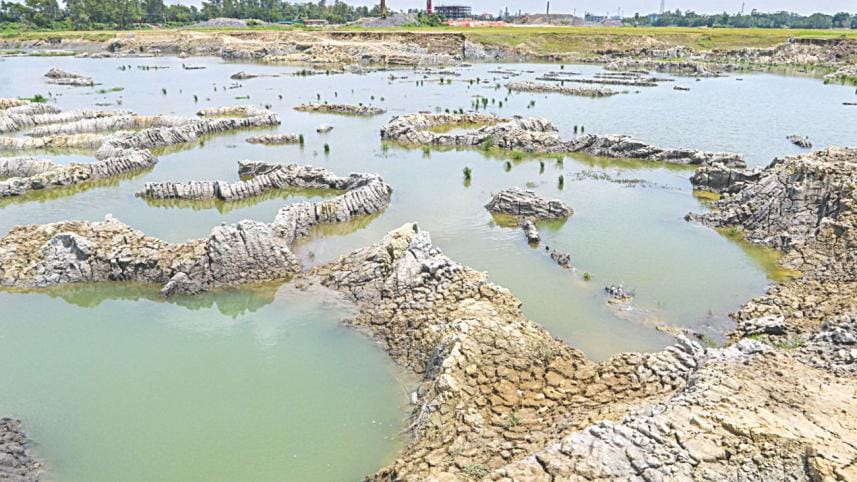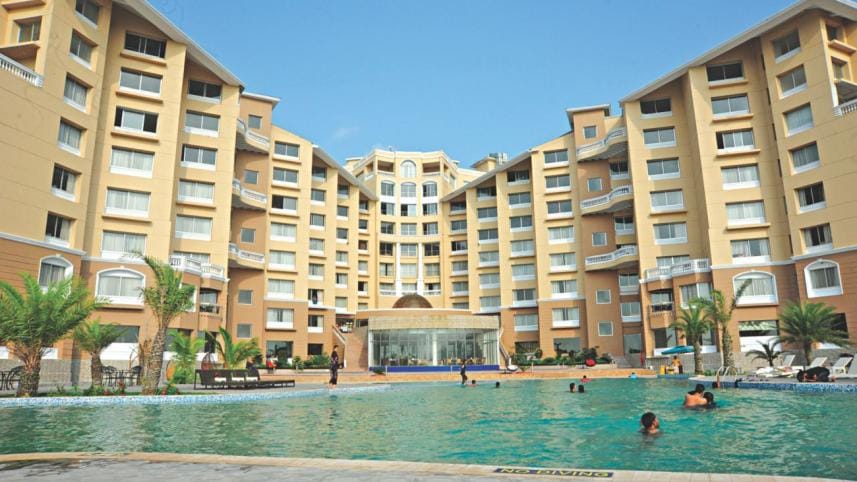Fertile land made barren for bricks

At first glance, it might look like a heavily bombarded area pitted with craters. Some of the larger ones are filled with rainwater. A closer look, however, would reveal diggers and labourers rushing at the place close to Chittagong-Cox's Bazar highway in Satkania.
What is going on there is robbery in broad daylight.
A section of local influential people, including some ruling party men, has forcefully been stripping away topsoil from vast areas of arable land along the highway.
|
…no person shall use the soil as raw material in brick manufacturing, after cutting or collecting it from agricultural land or hill or hillock. Brick Manufacturing and Brick Kilns Establishment (Control) Act 2013 |
They then sell the soil to brick kilns.
Whenever the land owners protested, they were either threatened or beaten up. Sometimes, they were given nominal payment in compensation.
This entire thing is happening under the very nose of the administration, according to some of the land owners and other locals.
Abdul Karim Chowdhury, who hails from the upazila, alleged that some syndicate members forcibly lifted topsoil from his 44 decimal of land in Bottol area around three months ago.
“As I learned about the incident, I rushed to the spot and asked them to stop. It made them furious and they attacked me with sharp weapons leaving me severely wounded,” he told The Daily Star recently.
After his recovery, he filed a case with Satkania Police Station against eight people, including Aminul Islam, joint secretary of Chittagong south district unit of Bangladesh Chhatra League, a pro-Awami League body.
“Police, however, did not arrest anyone. The criminals are now threatening me to withdraw the case,” he said.
Contacted, Aminul denied the allegation against him.
“The owners sell the soil as they get good money in return,” he said, adding that they do “their business due to a high demand of bricks in the upazila”.
Another local, Saiful Islam Suman, alleged that Aminul along with a top leader from the Satkania upazila unit of Krishak League, another pro-AL organisation, lifted soil from his one acre of land in the same area.
When Saiful protested, he was “assaulted” as well.
“I went to the police station but the law enforcers did not record the case and advised me to settle [the issue] through discussions,” he said.

Rafiqul Alam, OC of the police station, refuted the allegation. “I don't clearly remember the incident. But we do lodge cases if there is a valid ground. Besides, if we don't take any case, people can still go to our higher officials or even to the court to file them,” he said.
This correspondent called the Krishak League leader several times on his cell phone for comments but he did not pick up.
During a visit, The Daily Star correspondent saw topsoil being removed from arable land in different areas in the upazila headquarters and adjacent areas. At least 45 brick kilns were emitting plumes of smoke nearby. Piles of firewood were lying in places.
Locals said topsoil was being lifted from arable land in different areas of municipality, Dhemsha, Keuchia and Chhadaha unions as well.
A local citizens' platform, Satkania Nagorik Samaj, led by AMM Minhajur Rahman, central organising secretary of Swadhinata Chikitsak Parishad, submitted a memorandum to the divisional and deputy commissioners of Chittagong on April 4, demanding action against the culprits.
The platform also formed a human chain in Keranihat area the same day.
Minhajur said after submitting the memorandum, the upazila administration conducted mobile court drive for three consecutive days but no one was arrested.
According to Minhajur, almost all the kilns in the upazila were unauthorised but the authorities concerned were “turning a blind eye to the issue”.
“The brick kilns are not only destroying topsoil but also polluting the local environment,” Minhajur said.
Several environment experts echoed Minhajur's views.
One of them is Prof Alok Paul, who teaches Geography and Environmental Studies at Chittagong University. He said if topsoil is removed, the land loses fertility and turns barren.
“Satkania is an area with fertile land...the land of the upazila is famous for good vegetable yields,” he said. “Destruction of the topsoil means destruction of the possibility of having the good yields”.
The kilns have been taking a toll on the environment in the area as they keep polluting the air, he said, adding that the ovens could cause several health problems, including respiratory issues, for the locals.
Alok added that brick kilns are supposed to be established in “selected places” away from locality but in most of the cases this is not followed.
Faridul Alam, general secretary of Satkania Brick Kilns Association, said the upazila had a total of 40 brick kilns and most of them were licensed.
He also denied the allegation that topsoil was being removed without permission from the land owners.
“We buy the soil from a third party but we know people sell the soil as their land is not fertile,” he told The Daily Star.
Satkania Upazila Nirbahi Officer Mobarak Hossain, however, said only 10 brick kilns in the upazila had licences.
“We have conducted mobile court drives recently to thwart lifting of topsoil,” he said, adding, “During the drives, 15 excavators were destroyed”.
Nazmul Huda, deputy director of Department of Environment (DoE), Chittagong, acknowledged that they had received a complaint from a local in Satkania who said somebody stripped away topsoil from his land forcibly.
“Our inspector has visited the area and we are investigating the matter,” he said, adding that no one could lift topsoil from cultivable land as per the law.
Asked why the authorities do not carry out frequent raids in the areas in question, he said, “We have a shortage of manpower. There are only two inspectors for four districts. We can't act promptly in all cases.”
WHAT THE LAW SAYS
As per Section 5 of Brick Manufacturing and Brick Kiln Establishment (Control) Act 2013, nobody can collect or use topsoil from agricultural land, soil cutting hills or dredging river or digging pond, canal or any wetland. Also, establishment of brick kilns is illegal near agricultural land.
However, the law does not clearly mention the source of mud to be used in the kilns.
Under the law, the penalty for using agricultural or hill soil for manufacturing bricks is maximum two years imprisonment or Tk 2 lakh fine or both, and for setting up kilns without licence, it will be one year jail term or Tk 1 lakh fine or both.
Currently, there are around 6,600 brick kilns across the country of which only around 150 produce bricks using modern technology, according to the DoE.
On an average, Bangladesh produces 1,720 crore pieces of brick in a year, according to a 2011 World Bank report. The Washington-based multilateral lender, in the report, forecast that the demand will rise 2-3 percent per year for the next 10 years.
The industry employs around 20 lakh people during the peak season and eight lakh in the off season.
In Bangladesh, around 95 percent of the brickfields use highly polluting fixed chimney kilns, as they require low capital and have high investment returns.
The government plans to phase out the polluting brick kilns industry by 2020.

 For all latest news, follow The Daily Star's Google News channel.
For all latest news, follow The Daily Star's Google News channel.
Comments